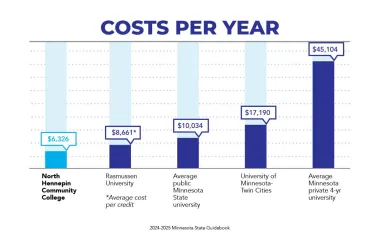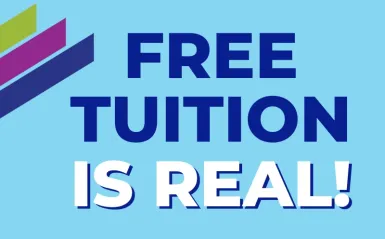Program Highlights
- Deep dives into technology used in business give you the opportunity to become the ‘go to’ person at any job you have that uses Microsoft Office applications, which are used in 83%* of businesses in the US, and millions world wide. *(Source)
- Free Microsoft Office Specialist certification, a globally recognized certification, is offered to all students in our program.
- Classes are taught by instructors who have significant industry experience and have used these applications and skills on the job themselves, so they understand not only software and management skills, but their importance in running a successful business, big or small.
- Instructors genuinely care about all students and work to provide resources to accommodate all types of learning needs and challenges.
- Our degree can be completed 100% online.
Career Outlook
The Business Computer Systems and Management AS is a broad degree that gives you options. You can increase your career options and earning potential by transferring to bachelor's program in a related field. Learn more on CareerWise.
Potential Job Titles
- Business Systems Analyst
- Computer and Information Systems Manager
- Computer Specialist
- Database Architect
- Programmer Analyst
- Systems Analyst
Where Grads Work
- Allianz Life Insurance
- Best Buy
- Boston Scientific
- Federal Reserve
- Health Partners
- Hennepin County
- Mayo Clinic
- Medtronic
- Target Corp.
- Wells Fargo
- And more!
Business Computer Systems and Management Classes at NHCC
Students in the Business Computer Systems and Management program learn by applying knowledge in real-world scenarios and hands-on projects.
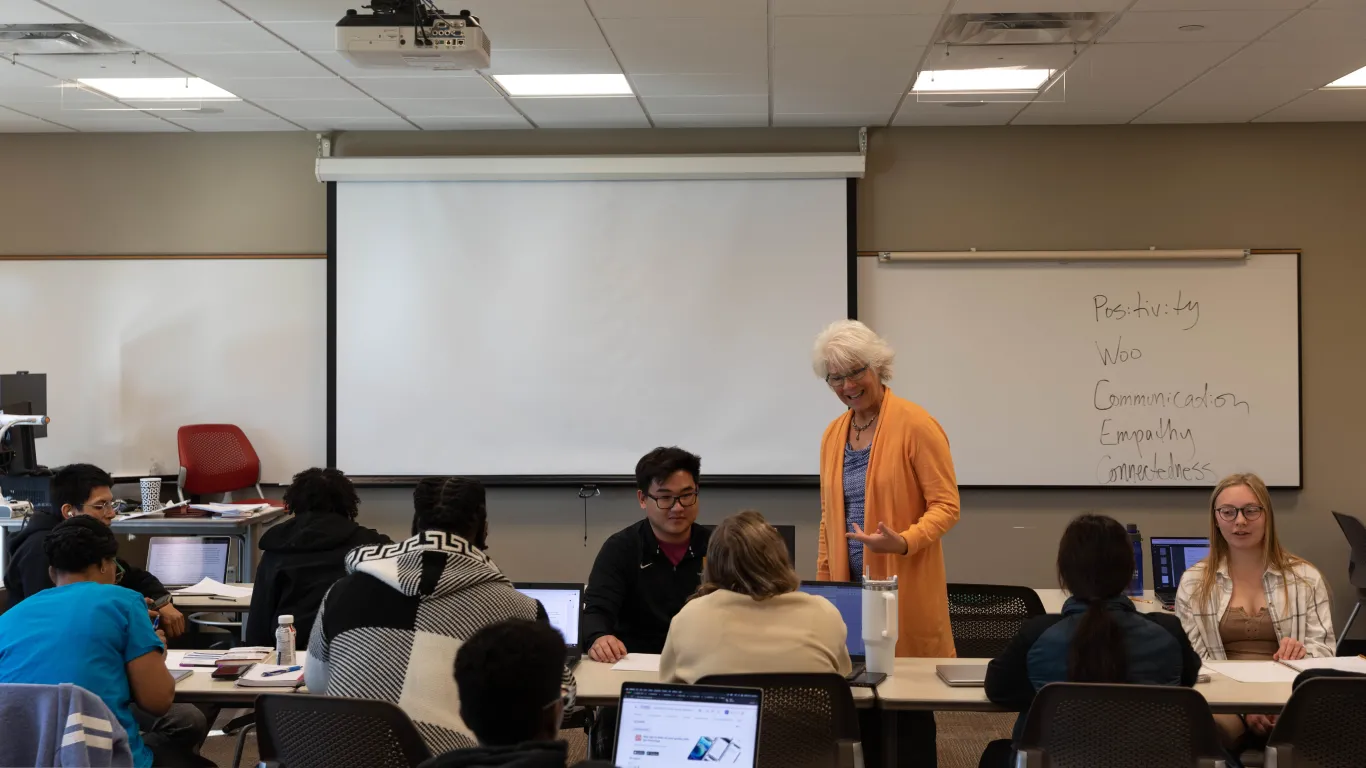
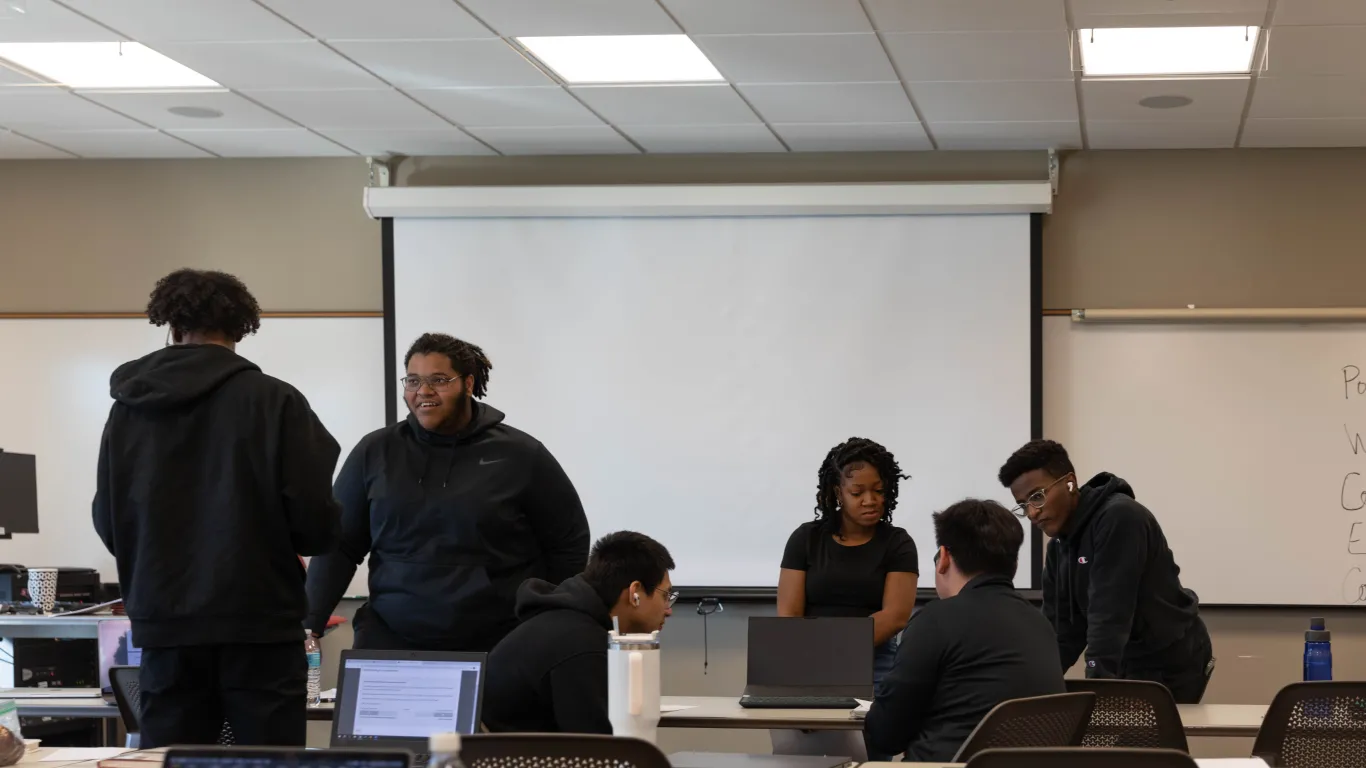
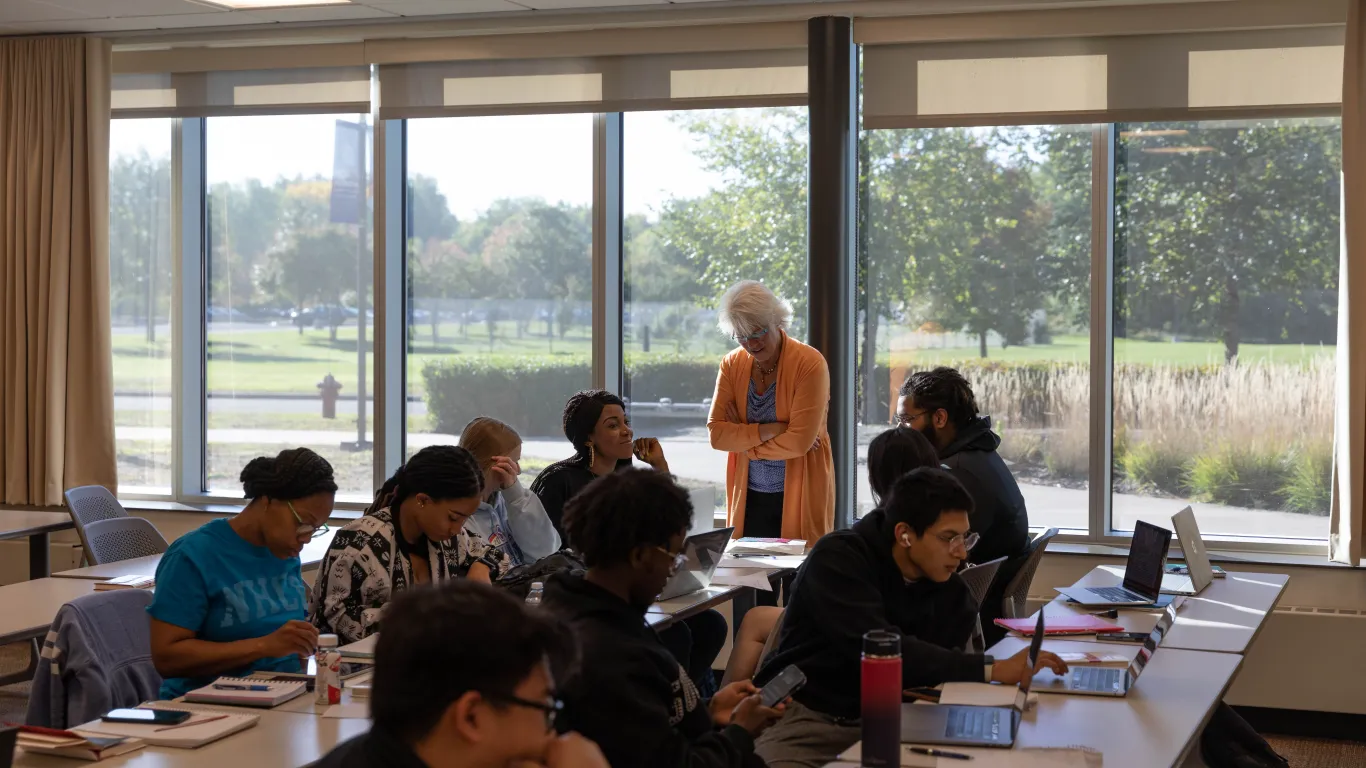
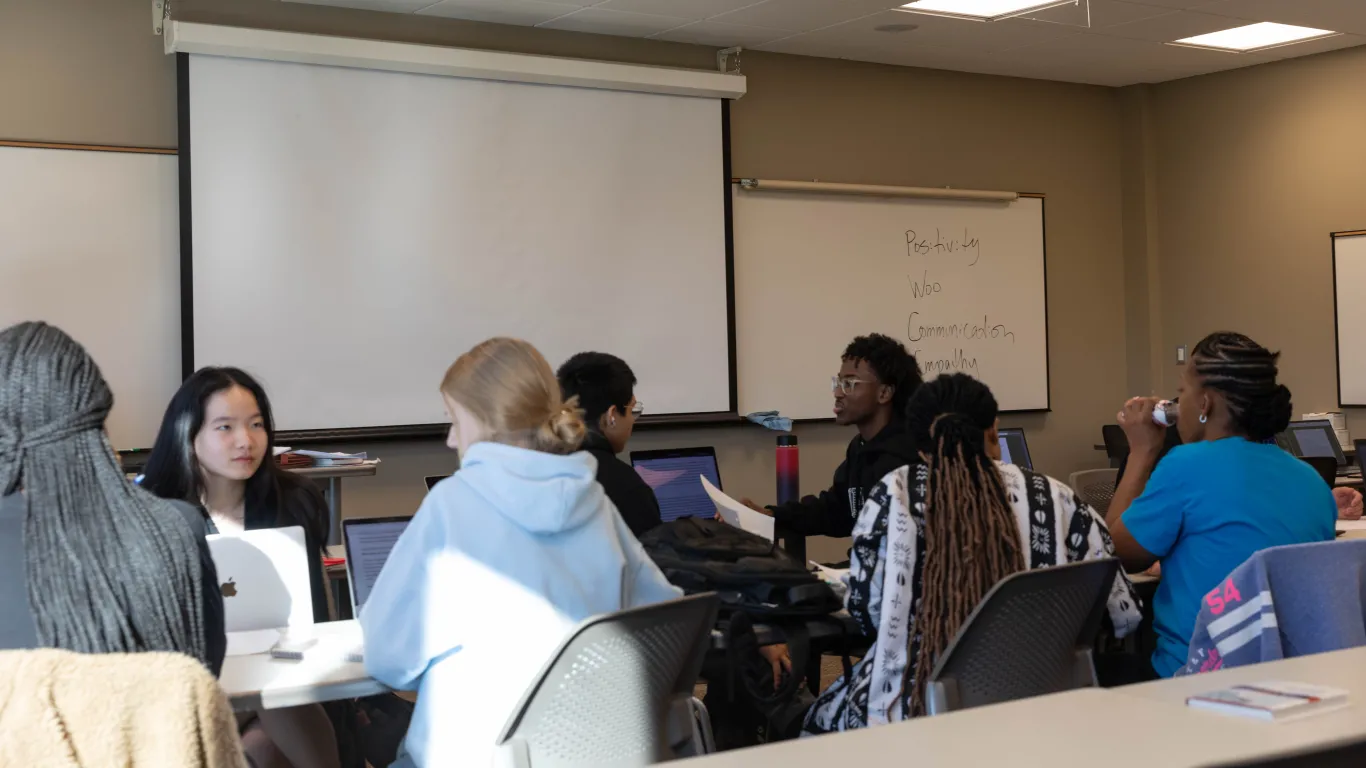
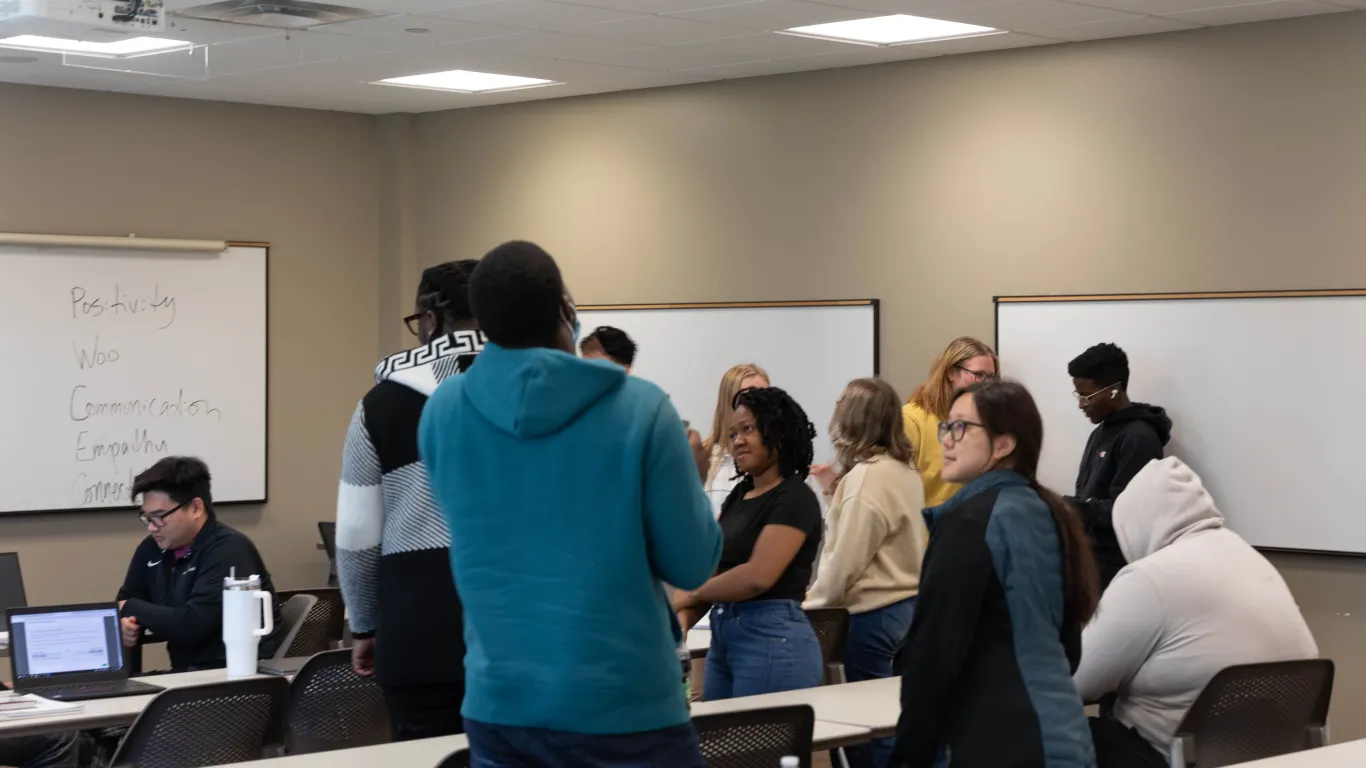
Paying For College
NHCC's tuition is among the most affordable in Minnesota.
Financial Aid
- Scholarships are money you don't have to repay
- Grants are money you don't have to repay
Free College Tuition
The North Star Promise scholarship program provides free college tuition to eligible students. Find out if you might be eligible.
Program Roadmaps
Program roadmaps provide students with a guide to understand the recommended course sequence to complete their degree.
Business Computer Systems and Management Curriculum
| Course Code | Title | Course Outlines | Goal Areas | Credits |
|---|---|---|---|---|
| ACCT 2111 | Financial Accounting | View-ACCT 2111 | n/a | 4 |
| BUS 2200 | Principles of Management | View-BUS 2200 | n/a | 3 |
| CIS 1101 | Business Computer Systems I | View-CIS 1101 | n/a | 3 |
| CIS 1220 | Decision Making Excel | View-CIS 1220 | n/a | 3 |
| CIS 1260 | Business Communications and Technology | View-CIS 1260 | n/a | 3 |
| CIS 1310 | The Whole Internet | View-CIS 1310 | n/a | 3 |
| CIS 2310 | Introduction to E-Commerce | View-CIS 2310 | n/a | 3 |
Course Title: Business Computer Systems I Goal Areas: n/a Credits: 3
Course Description: This course develops computer and digital literacy and emphasizes its importance in today's businesses and society. Through hands-on experience students will gain an understanding of computer concepts, capabilities and applications and be able to implement this knowledge in their professional and personal lives. Computer applications covered include word processing, spreadsheets, presentation graphics, databases, windows/operating system, e-mail use and management, folder and file organization and use of the Internet. Computer concepts covered include understanding computers and mobile devices, how a computer works, managing files, computer and mobile device hardware components, digital safety and security, application programs, input and output devices, digital storage options, ethical practices and Internet basics. Hands-on experience will be provided on computers in the Windows environment using the Microsoft Office Suite including Word, Excel, Access, and PowerPoint. Knowledge of the keyboard is recommended for this course. Check with your instructor for the software edition that will be used.
Course Title: Decision Making Excel Goal Areas: n/a Credits: 3
Course Description: This course uses Microsoft Excel as a problem solving tool in analyzing and designing solutions for common business and organizational problems and then using that information to guide decision-making. This course is for anyone who has to analyze, share, chart and manage information to make more informed decisions. Problems are taken from management, accounting and finance, manufacturing and production, sales and marketing and human resources. Beginning to advanced spreadsheet concepts covered include creating, editing, formatting, printing and saving worksheets, creating charts, filtering lists, creating pivot tables, inventing macros, importing data, creating data tables, evaluating and using functions, constructing formulas, integrating worksheet data with other programs and ethical Excel practices. After this course, the student would be prepared to take the Microsoft Office Specialist (MOS): Excel Exam. Knowledge of the keyboard is recommended for this course. Check with your instructor for the software edition that will be used.
Course Title: Business Communications and Technology Goal Areas: n/a Credits: 3
Course Description: This course provides students the knowledge to become successful communicators in a business environment through improving and practicing written, oral, face to face, and virtual technology based communication skills, processes, and strategies. This class will incorporate the effective use of Web-based communication, video conferencing, e-mail etiquette, presentation skills, presentation technologies, teleconferencing, and telephone usage. Students will also apply improved verbal, nonverbal, listening, writing, team, conflict, and negotiation skills in organizational situations. This course is for any student wishing to increase their business communication effectiveness in a global and technological business environment.Recommended: Completion of ENGL 1201 College Writing I and CIS 1101 Business Computer Systems I.
Course Title: The Whole Internet Goal Areas: n/a Credits: 3
Course Description: This course provides a comprehensive understanding of the Internet. This course is for anyone who wants to use the internet effectively, efficiently and safely, understand the uses of the Internet, create web pages and also increase their confidence and knowledge. Students will learn about the basic technology that supports the internet, effectively use e-mail and other types of communication, explore virtual communities and web tools, use search engines and directories to find information on the internet, evaluate the quality of web resources, locate software, explore e-commerce concepts, learn how to use the internet safely, manage common security threats and create web pages. Students will use e-mail, a class web site, and other web based tools to develop proficiency. The course explores current internet innovations. Previous exposure to the internet is not required.
Course Title: Financial Accounting Goal Areas: n/a Credits: 4
Course Description: This course is a study of the accounting principles and concepts used to understand and develop financial statements. Topics include accruals and deferrals, revenues, expenses, assets, liabilities, equities, and cash flows. The course will analyze current industry financial statements from the point of view of investors and creditors for profitability, liquidity and risk.
Course Title: Principles of Management Goal Areas: n/a Credits: 3
Course Description: This course is an introduction to the functions of management: planning, organizing, directing, and controlling. The course explores how each of the management functions are implemented to impact organizational efficiency and effectiveness. Local, national, and global environments are presented as strategic factors to be understood by contemporary managers. The importance of managing competitively and intelligently within a diverse environment is stressed. Situational cases are completed to reinforce decision-making in each of the function areas.
Course Title: Introduction to E-Commerce Goal Areas: n/a Credits: 3
Course Description: This course introduces students to the key strategic business and technological elements of electronic commerce. Students will explore the theory, practice and technology of conducting business over the internet and the World Wide Web.This course is for students who want to put their business on the internet, work at companies that want to do business over the internet, want to know more about business and the internet or want to know more about emerging e-commerce technology. Students will focus on applying key concepts through hands-on real world e-commerce planning and web site development. Topics covered include identifying e-commerce opportunities, marketing and selling on the internet, building a web presence, designing a web site, improving efficiency and reducing costs through business-to-business activities, using social networking to connect with customers and suppliers, exploring mobile commerce opportunities, analyzing electronic commerce software, hardware and commerce service providers, investigating electronic payment systems, examining electronic commerce security, thinking globally, scrutinizing legal, ethical and tax issues and planning. Also includes identifying current issues in e-commerce and emerging technology. Experience with programming languages or creating web sites is not required.NOTE: Computer and internet knowledge recommended
| Course Code | Title | Course Outlines | Goal Areas | Credits |
|---|---|---|---|---|
| Program Electives - 8 credits | ||||
| BUS 2600 | Principles of Marketing or | View-BUS 2600 | n/a | 3 |
| CIS 1102 | Business Computer Systems II or | View-CIS 1102 | n/a | 3 |
| CIS 1200 | Word Processing or | View-CIS 1200 | n/a | 3 |
| CIS 1230 | Business Presentations: PowerPoint or | View-CIS 1230 | n/a | 3 |
| CIS 1240 | Information Management: Access or | View-CIS 1240 | n/a | 3 |
| CIS 1320 | Web Tools or | View-CIS 1320 | n/a | 2 |
| CIS 1700 | Project Management Software Tools or | View-CIS 1700 | n/a | 3 |
| CIS 1990 | Computer Information Systems Mgmt Special Topics | View-CIS 1990 | n/a | 1-4 |
Course Title: Business Computer Systems II Goal Areas: n/a Credits: 3
Course Description: Emphasis is on an in-depth understanding of the Microsoft Office Suite beyond the fundamentals of CIS 1101. Students will develop their skills with exercise-oriented learning by completing advanced training working with spreadsheets, word processing, presentation graphics, and relational databases. Students will complete an integrated application project incorporating several software applications into one final document. Computer concepts covered include communication networks, operating systems, the internet, database management, data security, computer careers, and background to become a productive, knowledgeable computer consumer and professional. Hands-on experience suitable for professional purposes or personal use will be provided on computers in the Windows environment using the advanced features of the Microsoft Office Suite including Word, Excel, Access, and PowerPoint.If you believe you have computer experience that is equivalent to the prerequisites of this course, CIS 1101, please contact the instructor for permission to register for this class.Check with your instructor for the software edition that will be used.
Course Title: Word Processing Goal Areas: n/a Credits: 3
Course Description: This course introduces students to the word processing cycle and how word processing is used in the work place. This course is for anyone who needs to prepare their own business documents. Students will use the Microsoft Office Word application to create and edit business documents, enhance page layout, create tables, create reports, create columns, and create form letters and merge with a mailing list. Other topics covered include: styles, templates, mailing labels, drawing objects, graphics, and WordArt. After this course, the student would be prepared to take the Microsoft Office Certified Application Specialist Exam for Word.Knowledge of the keyboard is recommended for this course. Check with your instructor for the software edition that will be used.
Course Title: Business Presentations: PowerPoint Goal Areas: n/a Credits: 3
Course Description: This course introduces students to business presentation concepts and applications using the most current PowerPoint software. This course is for anyone who has to or wants to prepare engaging and effective business presentations. Students will plan, organize, prepare and produce professional quality presentations to meet organizational and business needs. Features studied include customizing a presentation, design templates, slide layouts, custom slide animation and transitions, using multimedia, charts and diagrams, integration, and tools for producing multiple outputs including publishing to the web. This course will provide a thorough understanding of PowerPoint's most important tools and features.After this course, the student would be prepared to take the Microsoft Office Specialist Exam for PowerPoint.NOTE: Knowledge of the keyboard is recommended for this course.
Course Title: Information Management: Access Goal Areas: n/a Credits: 3
Course Description: In this course students will learn how to plan, design, create, query, create forms and reports, export to and import data from and maintain a database. This course is for anyone who has to make more informed decisions by effectively tracking, reporting, and sharing information. Applications will be taken from a variety of business and organizational scenarios. Students will integrate databases with Excel and Word. Students will learn how databases interact with other applications (including the Internet) and can become the foundation for an e-commerce web site. Students will develop an understanding of how an effective database supports the business decision-making process. After taking this course, the student would be prepared to take the Microsoft Office Specialist Exam for Access. Completion of CIS 1101 or prior database experience is recommended for this course.
Course Title: Web Tools Goal Areas: n/a Credits: 2
Course Description: This class focuses on exploring, evaluating and learning how to use the latest tools and applications on the Internet. You will explore your interests and build a portfolio to demonstrate what you can do using innovative web based tools.Some of the tools and applications may include:Marketing and Business, Professional Networking, Virtual Environments, Bookmarking, Social Networks, Multimedia, Photos and Digital Images, Employment and Jobs, Collaboration, Video-Sharing Sites, Podcasts, Wikis, Blogs, Content Aggregation and Management, Organization, Games and Entertainment and more.This course is for anyone who wants to increase their internet skills and knowledge and understand current web tools.Some knowledge of the internet is required such as ability to use email and search engines. If you need more internet knowledge before taking this class, CIS 1310 The Whole Internet is recommended.The course may be modified as class needs dictate and to incorporate current events.
Course Title: Project Management Software Tools Goal Areas: n/a Credits: 3
Course Description: This course provides students with an understanding of the technology, concepts and process that supports project management. This course is for anyone who wants to develop project management software application skills in order to be more effective and efficient. Emphasis will be on a practical skill-building approach to project management software, concepts and process so students will apply knowledge to new problems, think critically and creatively, work collaboratively in teams and develop skills that can be applied outside the classroom. This course will include using project management software to bring about the successful completion of specific project goals and objectives.
Course Title: Computer Information Systems Mgmt Special Topics Goal Areas: n/a Credits: 1-4
Course Description: This course will provide flexibility in offering an in-depth review of topics of immediate importance and topical interest. These topics will go beyond the introductory courses in examining specific aspects of the subject matter.
Course Title: Principles of Marketing Goal Areas: n/a Credits: 3
Course Description: This course provides a market-oriented perspective to business decision-making. Students will learn how marketers provide value in satisfying customer needs and wants, determine which target markets the organization can best serve, and decide upon appropriate products, services, and programs to serve these markets. Topics include branding and product development, pricing strategies, marketing research, promotion, supply chain management, and service marketing. Current trends and developments in marketing practices are analyzed and strategic marketing ideas are implemented within an ethical framework. Courses Recommended: BUS 1100 Introduction to Business and CIS 1101 Business Computer Systems I
| Course Code | Title | Course Outlines | Goal Areas | Credits |
|---|---|---|---|---|
| COMM 1010 | Fundamentals of Public Speaking and | View-COMM 1010 | n/a | 3 |
| ECON 1060 | Principles of Macroeconomics and | View-ECON 1060 | n/a | 3 |
| ECON 1070 | Principles of Microeconomics and | View-ECON 1070 | n/a | 3 |
| MATH 1120 | College Algebra | View-MATH 1120 | n/a | 3 |
| MATH 1150 | ||||
| PHYS 1150 SOC 1110 (Choose 1 Course) | ||||
| PSYC 1150 | General Psychology or | View-PSYC 1150 | n/a | 3 |
| SOC 1110 | Introduction to Sociology and | View-SOC 1110 | n/a | 3 |
| College Writing I | ||||
| ENGL 1200 | Gateway College Writing or | View-ENGL 1200 | n/a | 4 |
| ENGL 1201 | College Writing I | View-ENGL 1201 | n/a | 4 |
Course Title: Fundamentals of Public Speaking Goal Areas: 01 Credits: 3
Course Description: This course provides instruction and practical experience in the basics of public speaking. This course has a performance component: students are expected to create and deliver informative, persuasive and other types of speeches.
Course Title: Principles of Macroeconomics Goal Areas: 05,08 Credits: 3
Course Description: This course covers mainstream theories, the economy's recent performance, national income and output levels, money and the banking system, inflation and unemployment, fiscal and monetary policies, economic growth, and international trade.
Course Title: Principles of Microeconomics Goal Areas: 05 Credits: 3
Course Description: This course covers theories of consumer and producer behavior as well as market structure, the role of government in the economy, distribution of income, externalities, and taxes.
Course Title: Introduction to Sociology Goal Areas: 05,07 Credits: 3
Course Description: This course is a study of social and cultural aspects of human behavior. Topics include society and culture, roles and norms, groups and organizations, deviance, inequality, social and cultural change, and research methods.
Course Title: College Algebra Goal Areas: 04 Credits: 3
Course Description: This class is designed for people who will benefit from more time and additional support to learn the content. It is designed to be taken at the same time as Math 920: College Algebra Support. This class prepares students for Calculus I (Math 1221) when taken in sequence with Pre-Calculus (Math 1170). Students not planning to take Calculus I may want to consider taking a different math class such as Elementary Statistics (Math 1130), Finite Math (Math 1140), or Survey of Math (Math 1010). Topics include polynomial, rational, inverse, exponential, and logarithmic functions and their applications. Additional topics include systems of non-linear equations, systems of linear equations, and matrices.
Course Title: General Psychology Goal Areas: 05 Credits: 3
Course Description: This course provides an overview of topics in psychology. Topics may include history of psychology, research methods, physiological psychology, sensation and perception, consciousness, learning, memory, motivation and emotion, personality, stress and coping, abnormal behavior, therapy, and social psychology. Students are strongly encouraged to check with an advisor to determine if this is the appropriate course for their degree/program. You must meet perquisites or obtain instructor permission to take this course.
Course Title: Gateway College Writing Goal Areas: 01 Credits: 4
Course Description: This class provides extended practice in critical reading, writing, and thinking skills. Students will develop an effective writing process and work to achieve college-level competence in reading and responding to texts, visuals, events, and ideas in a variety of written formats, with an emphasis on the academic essay. Audience awareness, interpretation and analysis, logical reasoning, and persuasive and argumentative skills will be developed. MLA style documentation of primary sources will be included.
Course Title: College Writing I Goal Areas: 01 Credits: 4
Course Description: This class provides extended practice in critical reading, writing, and thinking skills. Students will develop an effective writing process and work to achieve college-level competence in reading and responding to texts, visuals, events, and ideas in a variety of written formats, with an emphasis on the academic essay. Audience awareness, interpretation and analysis, logical reasoning, and persuasive and argumentative skills will be developed. MLA style documentation of primary sources will be included.
| Natural Sciences Mathematics/Logical Reasoning (Goal Area 3 4) - 3 credits: ANTH1020(3), BIOL1000(4), BIOL1001(4), BIOL1002(4), BIOL1030(4), BIOL1101(4), BIOL1102(4), BIOL1120(3), BIOL1130(4), BIOL1140(4), BIOL1160(4), BIOL1200(4), BIOL1350(3), BIOL1360(4), BIOL1610(1), BIOL1650(1), BIOL2020(4), BIOL2030(4), BIOL2100(4), BIOL2111(4), BIOL2112(4), BIOL2360(4), CHEM1000(4), CHEM1010(4), CHEM1030(4), CHEM1061(4), CHEM1062(4), CHEM2061(5), CHEM2062(5) GEOG1010(3), GEOL1010(2), GEOL1020(2), GEOL1030(2), GEOL1040(2), GEOL1110(4), GEOL1120(4), GEOL1130(4), GEOL1150(4), GEOL1160(4), GEOL1850(3), GEOL1851(1), MATH1010(3), MATH1031(3), MATH1032(3), MATH1080(3), MATH1090(4), MATH1120(3), MATH1130(3), MATH1140(3), MATH1150(3), MATH1160(4), MATH1170(4), MATH1180(5), MATH1190(5), MATH1200(3), MATH1221(5), MATH1222(5), MATH2010(3), MATH2220(5), MATH2300(4), MATH2400(4), NSCI1000(4), NSCI1010(1), NSCI1020(1), NSCI1030(1), NSCI1050(4), NSCI1060(3), NSCI1061(1), NSCI1070(3), NSCI1071(1), NSCI1110(4), NSCI1120(4), PHIL1050(3), PHYS1000(4), PHYS1030(4), PHYS1050(4), PHYS1060(3), PHYS1061(1), PHYS1070(3), PHYS1071(1), PHYS1120(4), PHYS1140(3), PHYS1201(5), PHYS1202(5), PHYS1231(4), PHYS1232(3), PHYS1400(3), PHYS1410(1), PHYS1450(3), PHYS1460(1), PHYS1601(5), PHYS1602(5) |
| 15 Credits must be earned at NHCC |
| MnTC Electives (Goal Areas 1, 6, 7, 9 10) - 7 credits: ANTH1020(3), ANTH1130(3), ANTH1140(3), ARBC1030(3), ART1010,(1), ART1020(1), ART1040(3), ART1050(3), ART1101(3), ART1102(3), ART1160(3), ART1170(3), ART1270(3), ART1301(3), ART1302(3), ART1310(3), ART1320(3), ART1340(3), ART1341(3), ART1361(3), ART1362(3), ART1401(3), ART1402(3), ART1550(3), ART1601(3), ART1602(3), ART1650(3), ART1770(3), ART1810(1), ART1820(2), ART2180(3), ART2190(3), ART2300(2), ART2611(3), ART2612(3), ART2640(3), ART2740(1), ART2750(1), ART2780(1), ART2781(1), ART2782(1), ART2800(1), ART2820(1), ART2860(1), ART2900(1), ART2970(1), ASL1300(3), BIOL1030(4), BIOL1160(4), BIOL1200(4), BIOL1600(1), BIOL1610(1), CHEM1000(4), CHEM1010(4), COMM1010(3), COMM1110(3), COMM1210(3), COMM1310(3), COMM1410(3), COMM1510(3), COMM1550 (3), COMM1610(3), COMM1710(3), COMM1810(3), COMM1910(3), COMM2610(3), ECON1050(3), ENGL1150(3), ENGL1202(2), ENGL1250(2), ENGL1400(3), ENGL1450(3), ENGL1900(3), ENGL1950(3), ENGL2010(3), ENGL2020(3), ENGL2030(3), ENGL2150(3), ENGL2270(3), ENGL2300(3), ENGL2310(3), ENGL2320(3), ENGL2330(3), ENGL2340(3), ENGL2350(3), ENGL2360(3), ENGL2370(3), ENGL2380(3), ENGL2390(3), ENGL2410(3), ENGL2450(3), ENGL2460(3), ENGL2500(3), ENGL2540(3), ENGL2550(3), ENGL2560(3), ENGL2570(3), ENGL2580(3), ENGL2900(3), ENGL2950(3), GCST1030(3), GCST1040(3), GCST1210(3), GCST1211(3), GCST1212(3), GCST1213(3), GCST1220(2), GCST1301(3), GCST1320(3), GCST1501(3), GCST1502(3), GCST1503(3), GCST1504(3), GCST1505(3),GCST1700(3), GCST1964(4), GCST1978(3), GCST2250(3), GCST2410(3), GEOG1000(2), GEOG1010(3), GEOG1040(3), GEOG1190(3), GEOL1010(2), GEOL1020(2), GEOL1030(2), GEOL1040(2), GEOL1120(4), GEOL1150(4), GEOL1160(4), GEOL1850(3), GEOL1851(1), GERM1030(3), GWS1501(3), GWS1502(3), GWS1503(3), GWS1504(3), GWS1505(3), HIST1200(3), HIST1210(3), HIST1220(3), HIST1230(3), HIST1240(3), HIST1270(3), HIST1700(3), HIST2600(3), HIST2700(3), INTD1030(3), INTD1040(3), INTD1210(3), INTD1211(3), INTD1212(3), MUSC1130(1), MUSC1160(1), MUSC1170(1), MUSC1180(1), MUSC1200(3), MUSC1220(3), MUSC1241(3), MUSC1242(3), MUSC1300(3), MUSC1320(1), MUSC1350(3), MUSC1370(3), MUSC1500(2), MUSC1501(2), MUSC1502(2), MUSC1510(1), MUSC1560(1), MUSC1600(2), MUSC1610(1), MUSC1800(2), MUSC1801(2), MUSC1802(2), MUSC1810(1), MUSC1830(1), MUSC1850(1), MUSC1860(1), MUSC1870(1), MUSC2010(2), MUSC2170(3), MUSC2180(3), MUSC2241(3), MUSC2242(3), MUSC2970(1), NSCI1110(4), PHIL1010(3), PHIL1020(3), PHIL1030(3), PHIL1040(3), PHIL1060(3), PHIL1070(3), PHIL1080(3), PHIL1110(3), PHIL1120(3), PHIL1200(3), PHIL1210(3), PHIL1220(3), PHIL1230(3), POLS1100(3), POLS1140(3), PSYC1165(3), PSYC1170(3), PSYC1220(3), PSYC2110(3), PSYC2340(3), SOC1110(3), SOC1130(3), SOC2110(3), SOC2210(3), SPAN1030(3), SPAN2201(5), SPAN2202(5), TFT1200(3), TFT1210(3), TFT1250(3), TFT1260(3), TFT1270(3), TFT1280(3), TFT1290(3), TFT1310(3), TFT1320(3), TFT1350(3), TFT1500(3), TFT1510(3), TFT1520(3), TFT1531(3), TFT1532(3), TFT1540(3), TFT1600(1), TFT1610(1), TFT1710(3), TFT2010(3), TFT2500(3), TFT2950(1) |
| Total Credits Required | 60 |
2024-2025
The Associate of Science Degree in Business Computer Systems and Management is designed for students who after completion of this degree are interested in continued study in a baccalaureate degree program in a related field as well as for students who are interested in careers in computers, management, business, education, or training. This degree is also meant for students who wish to enhance their computer and management knowledge in today's business world to help further their career. Students should consult an advisor/counselor for transfer opportunities to various Minnesota colleges. The courses from this program are delivered in the classroom and/or online.
This degree will articulate/transfer to Metropolitan State University for their Business Administration BS Degree.
Knowledge of Human Cultures and the Physical and Natural World, focused by:
- Effective use of uptodate technology and computer applications.
- Develop management and business principles, advanced technical and communication skills along with critical, independent and creative problem solving skills.
Intellectual and Practical Skills, focused by:
- Competent use of digital resources to access and evaluate information using current technology to perform basic business tasks.
- Demonstrate global thinking, working in teams, applying knowledge and focusing on handson real world situations.
- Develop teamwork, and critical and creative thinking practices to become more effective, efficient and productive.
Personal and Social Responsibility and Engagement, focused by:
- Collaborate as a member of a team solving diverse and complex problems common in business today.
- Develop ethical practices in using technology.
Integrative and Applied Learning, including:
- Integrate computer technology as it relates to a career in a variety of business career pathways.
Upon completion of the program the student will be prepared for entry level work in the business, computer, or management field.
Courses in this degree may transfer to four year colleges. Consult with an advisor for further information.
Program roadmaps provide students with a guide to understand the recommended course sequence to complete their degree.
Information on careers, including career descriptions, salary data, and employment outlook is available on the Bureau of Labor Statistics website and O*Net Online website.
If you are planning on transferring to another institution, follow the guidelines available on our transfer resources web page to help you plan the process: Transfer Information
The Associate of Science (A.S.) degree is intended for students whose primary goal is to complete the credentials for a specific career and/or prepare for transfer to complete a bachelor's degree at a college or university with whom North Hennepin Community College has an articulation agreement. The A.S. degree provides a balance of general education courses and the required scientific, professional or technical courses in the degree program.
A student shall:
- Earn a minimum of 60 semester credits as required in the program, with a grade point average of 2.00 (C) or above in courses taken at North Hennepin Community College. Specific programs may have additional requirements or a higher minimum grade point average.
- Earn a minimum of 15 semester credits at North Hennepin Community College. A student must complete at least 50% of career specific courses at North Hennepin Community College.
- Earn 30 credits in at least 6 Minnesota Transfer Curriculum (MnTC) goal areas.
- Earn 30 professional/technical credits.
- Have four years to complete the graduation requirements as published in the catalog in effect at the time of their initial enrollment. Students taking more than four years to complete their graduation requirements may follow any catalog published during the four year period preceding their graduation.
Completion of an A.S. degree fulfills the Goal Area 2 requirement of the Minnesota Transfer Curriculum (MnTC).
Developmental Courses Some students may need preparatory course(s) in Math and/or English. Courses numbered below 1000 will not apply toward a degree.
Equal Opportunity Employer and Disability Access Information North Hennepin Community College is a member of Minnesota State Colleges and Universities system and an equal opportunity employer and educator. This document is available in alternative formats to individuals with disabilities by calling 7634930555 or through the Minnesota Relay Service at 18006273529.
North Hennepin Community College is accredited by the Higher Learning Commission (hlcommission.org), an institutional accreditation agency recognized by the U.S. Department of Education.
30 N. LaSalle Street, Suite 2400
Chicago, IL 60602-2504
1-800-621-7440
Get Started
If you're ready to get started, apply to NHCC. If you'd like to learn more, you can visit campus or request information.
